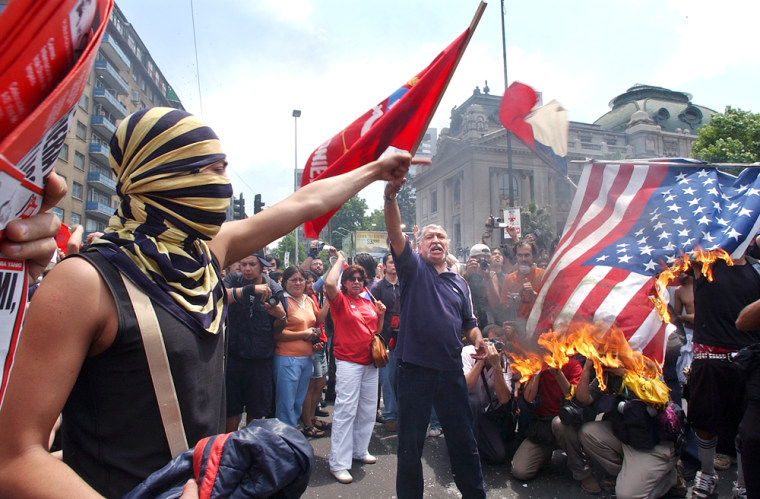More than 25,000 protesters marched through downtown Santiago on Friday, demonstrating against an economic summit of Pacific Rim leaders, the attendance of President Bush and the U.S.-led war in Iraq. Protests elsewhere turned violent and dozens were arrested.
The march opposing the Asia-Pacific Economic Cooperation summit was peaceful, but riot police used water cannons and tear gas earlier to break up an unauthorized demonstration by hundreds of rock-throwing protesters.
The summit, which opens Saturday, has been greeted by four straight days of protests. Bush and leaders from 21 other nations were expected to discuss issues ranging from trade and security to growing corruption. Bush is also expected to seek support to pressure on North Korea to return to nuclear talks.
In the face of growing opposition, security has been heavy with about 4,500 extra police posted on the streets of Santiago and another 1,500 on call should the need arise in the city of 5.5 million.
Demonstrators hurl rocks, Molotov cocktails
Violence also broke out at a rock concert in a park following the march when a group of about 50 masked demonstrators hurled rocks at police, overturned benches and tore down traffic signs. One news photographer was hit in the head with rock, but was not badly injured.
The demonstrators then hurled Molotov cocktails at a car dealership a block away, burning two vehicles, before fleeing.
About 130 protesters were detained, and Deputy Interior Minister Jorge Correa blamed the violence “on a group of vandals who are the real threat to Chileans’ rights to gather peacefully and freely.”
“The whole weight of law will follow them,” Correa said.
Shortly before Bush arrived in the capital Friday night, a fresh round of protests broke out in Valparaiso, a port city 75 miles north of Santiago.
Police used water cannons and tear gas to break up the demonstration, chasing the protesters and detaining more than 50. Two demonstrators were injured, none seriously.
Organizers of the Santiago march said 40,000 protesters took part in the government-authorized event far from the conference center where leaders of 21 Pacific region economies will meet. Police put the number at 25,000.
While some protesters said they oppose the APEC summit, which they likened to a rich man’s club that does nothing for the poor, much of the rage was aimed at Bush and the U.S.-led war in Iraq.
Marchers chanted and held up posters criticizing the U.S. leader. Some also expressed sympathy with the Iraqi insurgents in Fallujah.
Meetings on North Korea, trade
Bush was to hold one-on-one meetings Saturday with counterparts from China, Japan, South Korea, Russia — all involved in the six-nation talks with North Korea. Three rounds of talks have yielded little progress and Pyongyang refused to attend a fourth session in September. On Friday, Bush won support from China for a strong U.S. approach toward North Korea.
Numerous other bilateral meetings were planned between world leaders, including a key session Sunday between the leaders of Japan and China over a Chinese nuclear submarine’s recent intrusion into Japanese waters.
At the APEC conference center Friday, business executives, economists and other experts gathered for seminars and informal talks about trade and growing business ties between Asia and Latin America.
The protests came a day after trade and foreign ministers from 21 Pacific Rim economies issued a strong show of support for ongoing World Trade Organization talks. They also agreed on new counterterrorism measures aimed at protecting everything from air travel to shipping and food stocks.
APEC members also pledged to implement new security measures to tighten access to shoulder-fired missiles, preventing the possibility of terrorists acquiring them and downing civilian jetliners. They also scheduled for development a counterterrorism passenger alert system to make flights safer.
APEC’s members include Australia, Brunei, Canada, Chile, China, Hong Kong, Indonesia, Japan, Malaysia, Mexico, New Zealand, Papua New Guinea, Peru, the Philippines, Russia, Singapore, South Korea, Taiwan, Thailand, the United States and Vietnam.
